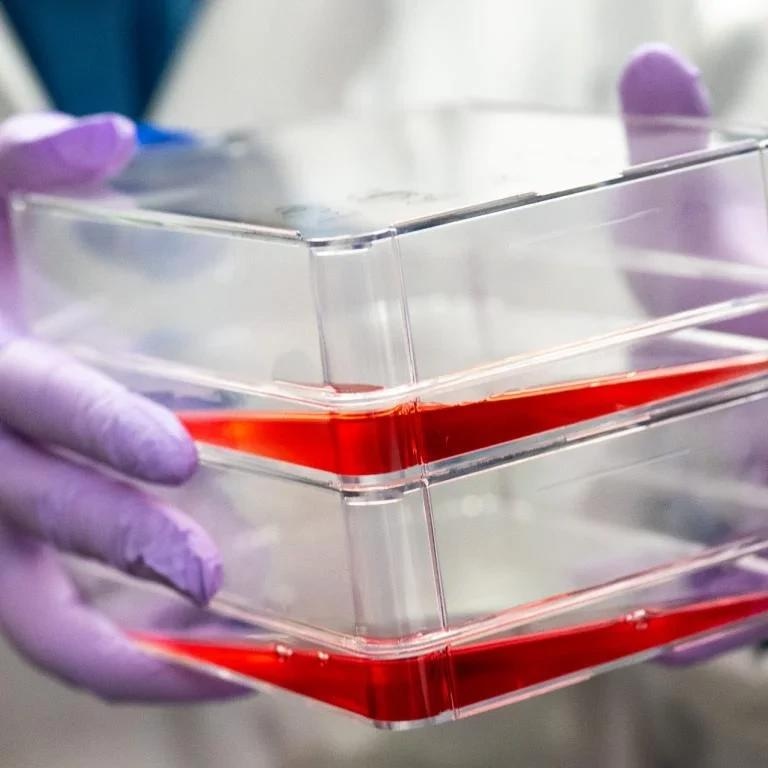Reviewed by Danielle Ellis, B.Sc.Jan 29 2024
Technological advancements are making cellular agriculture the production of meat from cells grown in bioreactors as opposed to gathered from farm animals a more attractive option for the food sector.
 “While we significantly cut the cost of media, there is still some optimization that needs to be done to make it industry-ready,” said Andrew Stout. Image Credit: Alonso Nichols
“While we significantly cut the cost of media, there is still some optimization that needs to be done to make it industry-ready,” said Andrew Stout. Image Credit: Alonso Nichols
Recently, researchers at the Tufts University Center for Cellular Agriculture (TUCCA), under the direction of David Kaplan, Stern Family Professor of Engineering, have made one such advancement: they have produced bovine (beef) muscle cells that are capable of producing their own growth factors. This development has the potential to drastically reduce production costs.
Growth factors attach to cell surface receptors and give signals to cells to proliferate and differentiate into mature cells of various kinds, whether they are utilized for grown meat or in lab research. Researchers engineered stem cells to make their own fibroblast growth factor (FGF), which stimulates the formation of skeletal muscle cells the kind found in steaks and hamburgers in this study, which was reported in the journal Cell Reports Sustainability.
FGF is not exactly a nutrient, and it is more like an instruction for the cells to behave in a certain way. What we did was engineer bovine muscle stem cells to produce these growth factors and turn on the signaling pathways themselves.”
Andrew Stout, Study Lead Researcher and Director of Science, Cellular Agriculture Commercialization Lab, Tufts University
Up until recently, the surrounding liquid, or media, required the addition of growth agents. Growth factors made from recombinant protein and provided by industrial suppliers account for up to 90% of the total production costs of farmed meat.
The growth factors also need to be replaced every few days because their shelf life in the cell culture media is limited. This makes it more difficult to offer customers a product at a reasonable price. There are significant cost reductions when that element is removed from the growing media.
At the Cellular Agriculture Commercialization Lab, a technological incubator designed to take university innovations and develop them to the point where they may be deployed at an industrial scale in a commercial setting, Stout is leading several research projects.
Stout added, “While we significantly cut the cost of media, there is still some optimization that needs to be done to make it industry-ready, and we did see slower growth with the engineered cells, but I think we can overcome that.”
Modifying other cell growth pathways or the amount and timing of FGF expression within the cell are examples of possible strategies. “In this strategy, we are not adding foreign genes to the cell, just editing and expressing genes that are already there” to see whether they can enhance muscle cell development for the purpose of producing meat.
This strategy may also result in less complicated regulatory approval of the final food product because regulations pertaining to the inclusion of alien genes are stricter than those pertaining to the editing of native genes.
Will the same approach apply to other meats, such as fish, poultry, or pork? According to Stout, yes. Stout stated, “All muscle cells and many other cell types typically rely on FGF to grow,” He thinks the method will work for other meats as well, however, there might be differences in which species would express the optimum growth hormones.
Work is continuing at TUCCA and elsewhere to improve cultivated meat technology, including exploring ways to reduce the cost of nutrients in the growth media, and improving the texture, taste, and nutritional content of the meat. Products have already been awarded regulatory approval for consumption in the U.S. and globally, although costs and availability remain limiting.”
David Kaplan, Stern Family Professor of Engineering, Tufts University Center for Cellular Agriculture (TUCCA)
Kaplan said, “I think advances like this will bring us much closer to seeing affordable cultivated meat in our local supermarkets within the next few years.”
Source:
Journal reference:
Stout, A. J., et.al., (2024). Engineered autocrine signaling eliminates muscle cell FGF2 requirements for cultured meat production. Cell Reports Sustainability. doi.org/10.1016/j.crsus.2023.100009